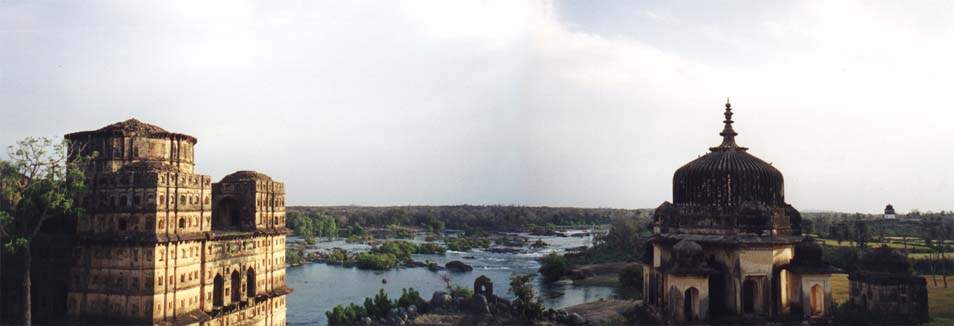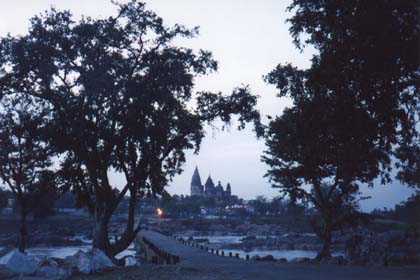|
Express to Peace The hectic pace of Jaipur and Agra have left me thirsting for a peaceful respite. I catch an auto rickshaw to Agra Cantonment, the central railway station, where I meet up with Alyse. We board the Shatabdi Express for a two hour air-tight whisking via air-conditioned stagnation to Jhansi, a crowded, noisy small-town crossroads. From Jhansi we catch a group auto rickshaw, known as a tempo, bound for Orchha. The tempo bubbles over with cramped humanity. As we sputter along, the countryside alternates between desert-like expanses and lush green vegetation. Only the railway follows this narrow road. Orchha is a welcome oasis of peace and quiet.
Temples dot the surrounding countryside, and a long, low, narrow bridge with no guard rails spans the holy Betwa River which runs alongside the town, bringing a welcome breeze that takes the edge off hot days. After a sweaty search, Alyse and I decide to stay at the Paryatak Hotel, a walled complex of low yellow buildings that resembles a military compound. The rooms are large, all cement and therefore refreshingly cool, with an attached bathroom with the usual hole in the ground and a place to plant each foot for doing your business. Toilet paper is not used in India, except by foreign tourists. In its place are a water faucet near ground level and a small bucket. I'm not sure of the exact technique, only that you use your left hand to clean yourself with the water, and end up much cleaner than you could ever get with toilet paper. Most hotels offer a second bucket as a waste basket for tourists' toilet paper. As the stench of the used-toilet-paper-filled bucket grows, curiosity about the Indian system of water and hand increases. Some leave toilet paper behind immediately; others take some time (it took me about a month), and others never change the habits they grew up with. Outside the Paryatak compound, rose gardens and temples from throughout time rise out of the trees. Life congregates in and around the temples. |

A view near Orchha. Scroll to the right on your browser to see the entire image -->
|
A small orange temple, the size of a garden shed, sits alone to the side of the road. It appears empty; Alyse and I stand in front of it, hesitant. A tall, lean, kindly man with long white hair that matches his long white beard approaches. He beckons us to remove our shoes and enter the temple. Inside is a large orange stone carving of Hanuman, the monkey god, a club in one hand. He is the faithful servant of Rama, and represents loyalty and devotion, as well as superhuman strength. He is also the chosen God of this bearded, smiling newfound friend, the caretaker of this intimate shrine. The sadhu bids us to come to his house, which sits on a small rise on the other side of the road. We follow him in the darkness to a stone lean-to. His house, two simple stone rooms, sits behind the lean-to. He rekindles a fire, warms a pot of water for chai and introduces himself with a charismatic smile as Sri Premdas Babaji. |
